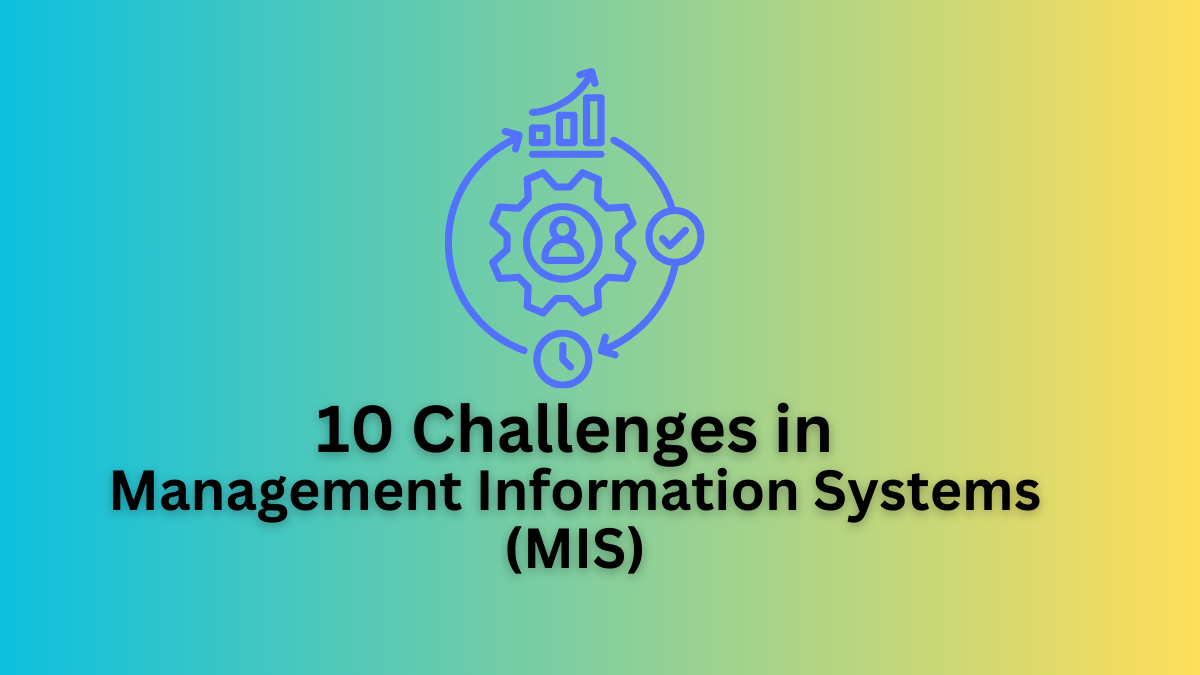Challenges in Management Information System (MIS)
A management information system has too much significance in today’s business world. However, implementing and managing a Management Information System (MIS) comes with its own set of challenges.
Here, we will explore 10 common challenges in management information system and strategies to overcome them:
Requirement of Skilled Staff
Challenge: Implementing and managing MIS requires professionals with a blend of business and technical skills, which can be challenging to find and retain.
Strategy: Invest in training and development programs to enhance existing staff skills. Collaborate with educational institutions for recruitment and talent development. Offer competitive compensation packages to attract and retain skilled professionals.
Keeping Pace with Technological Changes
Challenge: The rapid evolution of technology necessitates continuous upgrades and adaptations to MIS systems, leading to potential disruptions and resistance to change.
Strategy: Implement robust change management practices, including comprehensive training and support for employees. Foster a culture of innovation and adaptability within the organization. Regularly evaluate emerging technologies and their potential impact on MIS.
Interpreting and Utilizing Data Effectively
Challenge: While MIS systems generate vast amounts of data, interpreting and leveraging this data to drive decision-making can be complex and challenging.
Strategy: Invest in data analytics tools and expertise to analyze and interpret data effectively. Develop clear data governance policies to ensure data quality and consistency. Foster collaboration between IT and business teams to align data analysis with organizational goals.
Security Concerns
Challenge: With the increasing volume of data stored and processed by MIS systems, security breaches, and data privacy concerns pose significant risks to organizations.
Strategy: Implement robust cybersecurity measures, including encryption, access controls, and regular security audits. Educate employees about cybersecurity best practices and promote a culture of vigilance and compliance.
Read More: 10 Challenges in Teamwork
Integration of Legacy Systems
Challenge: Many organizations still rely on legacy systems, which may not be compatible with modern MIS platforms, leading to integration challenges and data silos.
Strategy: Prioritize interoperability and compatibility when selecting new MIS systems. Implement middleware and integration solutions to connect legacy systems with modern platforms. Develop a phased migration plan to minimize disruption and ensure a smooth transition.
Cost Management
Challenge: Implementing and maintaining MIS systems can be costly, especially for small and medium-sized enterprises with limited budgets.
Strategy: Conduct a thorough cost-benefit analysis to identify potential savings and ROI opportunities. Explore cloud-based solutions and software-as-a-service (SaaS) models to reduce upfront investment and ongoing maintenance costs. Consider outsourcing non-core MIS functions to specialized service providers.
Read More: 10 Challenges in Conflict Management
User Resistance and Adoption
Challenge: Employees may resist using new MIS systems due to fear of change, lack of training, or perceived inefficiencies.
Strategy: Involve end-users in the design and implementation process to address their concerns and ensure buy-in. Provide comprehensive training and ongoing support to help employees adapt to new systems. Highlight the benefits of MIS adoption, such as improved efficiency, data accuracy, and decision-making capabilities.
Scalability and Flexibility
Challenge: As organizations grow and evolve, their MIS requirements may change, requiring scalable and flexible solutions.
Strategy: Choose MIS systems that can scale with organizational growth and adapt to changing business needs. Implement modular and customizable solutions that allow for easy expansion and integration of new functionalities. Regularly review and update MIS strategies to align with evolving organizational goals.
Read More: 10 Challenges in Employee Motivation
Regulatory Compliance
Challenge: Organizations must comply with various regulatory requirements related to data protection, privacy, and industry-specific regulations.
Strategy: Stay informed about relevant regulations and ensure MIS systems are designed and implemented in compliance with legal requirements. Implement robust data governance and compliance measures, including data encryption, anonymization, and audit trails. Conduct regular compliance audits and assessments to identify and address any gaps or issues.
Vendor Selection and Management
Challenge: Choosing the right MIS vendor and effectively managing vendor relationships can be complex and challenging.
Strategy: Conduct thorough due diligence and evaluation of potential vendors, considering factors such as reputation, expertise, scalability, and support services. Establish clear expectations and communication channels with vendors, including service-level agreements (SLAs) and performance metrics. Regularly review vendor performance and seek feedback from end-users to ensure alignment with organizational needs and objectives.
In conclusion – these are the 10 challenges in management information system (MIS) and strategies to overcome those challenges.
